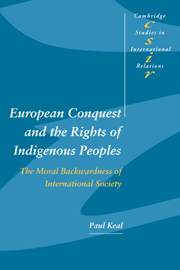 European Conquest and the Rights of Indigenous Peoples
European Conquest and the Rights of Indigenous Peoples Published online by Cambridge University Press: 03 December 2009
As agreed upon by the members of the UN Working Group on Indigenous Populations at its Eleventh Session, Geneva, July 1993. Adopted by the UX Sub-commission on Prevention of Discrimination and Protection of Minorities by its resolution 1994/45, August 26, 1994. UN Doc. E/CNA/1995/2, E/CNA/Sub.2/1994/56, at 105 (1994).
Affirming that indigenous peoples are equal in dignity and rights to all other peoples, while recognising the right of all peoples to be different, to consider themselves different, and to be respected as such,
Affirming also that all peoples contribute to the diversity and richness of civilisations and cultures, which constitute the common heritage of humankind,
Affirming further that all doctrines, policies and practices based on or advocating superiority of peoples or individuals on the basis of national origin, racial, religious, ethnic or cultural differences are racist, scientifically false, legally invalid, morally condemnable, and socially unjust,
Reaffirming also that indigenous peoples, in the exercise of their rights, should be free from discrimination of any kind,
Concerned that indigenous peoples have been deprived of their human rights and fundamental freedoms, resulting, inter alia, in their colonisation and dispossession of their lands, territories and resources, thus preventing them from exercising, in particular, their right to development in accordance with their own needs and interests,
Recognising the urgent need to respect and promote the inherent rights and characteristics of indigenous peoples, especially their rights to their lands, territories and resources, which derive from their political, economic and social structures and from their cultures, spiritual traditions, histories and philosophies,
To save this book to your Kindle, first ensure no-reply@cambridge.org is added to your Approved Personal Document E-mail List under your Personal Document Settings on the Manage Your Content and Devices page of your Amazon account. Then enter the ‘name’ part of your Kindle email address below. Find out more about saving to your Kindle.
Note you can select to save to either the @free.kindle.com or @kindle.com variations. ‘@free.kindle.com’ emails are free but can only be saved to your device when it is connected to wi-fi. ‘@kindle.com’ emails can be delivered even when you are not connected to wi-fi, but note that service fees apply.
Find out more about the Kindle Personal Document Service.
To save content items to your account, please confirm that you agree to abide by our usage policies. If this is the first time you use this feature, you will be asked to authorise Cambridge Core to connect with your account. Find out more about saving content to Dropbox.
To save content items to your account, please confirm that you agree to abide by our usage policies. If this is the first time you use this feature, you will be asked to authorise Cambridge Core to connect with your account. Find out more about saving content to Google Drive.